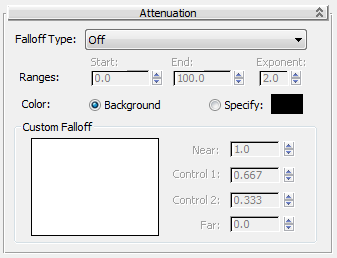When a ray is reflected off an object or refracted through it, by default the ray travels through space forever, with no attenuation. The controls in this rollout allow you to attenuate rays, so their strength diminishes over distance.
In the Raytrace map, attenuation is implemented by a clipping algorithm. Objects beyond the maximum attenuation range aren't even considered
by the raytracer. Because of this, assigning attenuation can speed up rendering time.
Interface
- Falloff Type
-
Choose the falloff to use.
- Turns off attenuation. (Default.)
- Sets linear attenuation. Linear attenuation is calculated between the start and end range values.
- Sets inverse square attenuation. Inverse square attenuation is calculated beginning at the start range, and doesn't use the
end range. Inverse square is the actual attenuation rate for light in the real world. However, it doesn't always give the
effect you want in a rendered scene.
- Sets exponential attenuation. Exponential attenuation is calculated between the start and end range values. You also specify
the exponent to use.
- Specifies a custom curve to use for attenuation (falloff).
- Start Range
-
The distance in world units where attenuation begins. Default=0.0.
- End Range
-
Sets the distance in world units where the ray is fully attenuated. Default=100.0.
This is not used by inverse square attenuation.
- Exponent
-
Sets the exponent used in exponential falloff. Default=2.0.
This is used only by exponential attenuation.
- Color
-
Affects the behavior of light rays as they attenuate out. By default, as a ray fades out, it is rendered as the background
color. You can set a custom color instead.
Custom Falloff group
These controls are inactive unless the Falloff Type is set to Custom Falloff.
- Custom Falloff
-
Uses the falloff curve to determine the falloff between the start and the end ranges.
These are the controls for custom attenuation. The custom attenuation curve is at the left. The gray scale bar below the curve
shows how the curve will affect the falloff as light rays diminish in strength.
- Near
-
Sets the strength of the reflected/refracted ray at the start range distance. This is a normalized percentage that can range
from 0.0 to 1.0. Default=1.0.
- Control 1
-
Controls the shape of the curve near the curve start. Default=0.667.
- Control 2
-
Controls the shape of the curve near the curve end. Default=0.333.
- Far
-
Sets the strength of the reflected/refracted ray at the end range distance. This is a normalized percentage that can range
from 0.0 to 1.0. Default=0.0.
